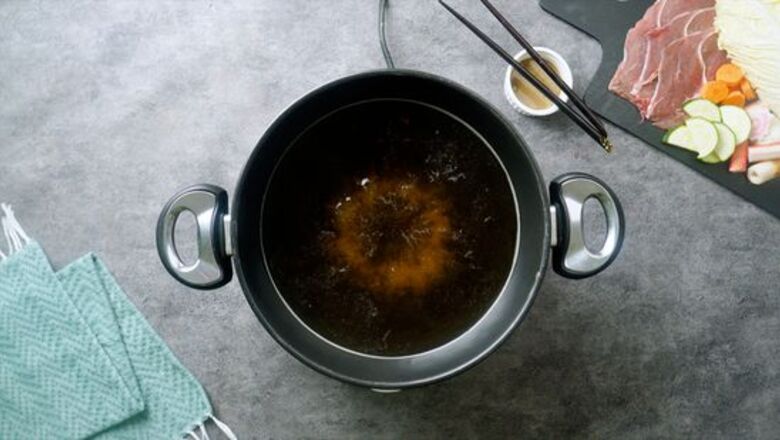
views
X
Research source
If it’s your first time eating shabu shabu at a restaurant, you might be feeling a little overwhelmed by all of the different ingredients and steps. Don’t worry though—eating shabu shabu is actually very simple once you know what to do.
Simmering the Broth
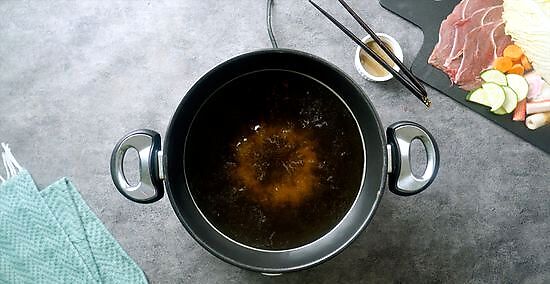
Wait for the broth your server brings you to come to a boil. When you order shabu shabu out, the first thing your server will do is bring you a large pot of broth, put it on the burner on your table, and turn up the heat to bring it to a boil. It may take a few minutes to start boiling, so hang out for a bit or look over the menu to see if there are any appetizers you’d like to try. Your server probably won’t stick around while the broth is coming to a boil—they’ll be back in the kitchen grabbing your meat and vegetables.
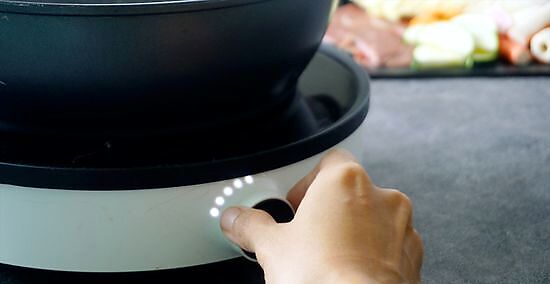
Lower the heat and simmer the broth once it starts to boil. If your server doesn’t make it back in time to do this for you, go ahead and turn down the burner yourself. You want the broth to be simmering, not boiling, when you cook the meat and vegetables. Otherwise, everything will be overcooked and unpleasant. If you’re not sure how to work the burner, flag down someone at the restaurant and ask them to assist you.
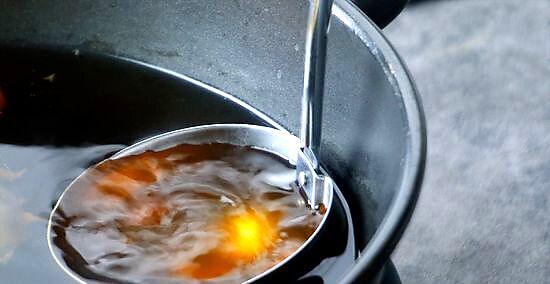
Don’t drink the broth while you’re waiting for your meat and vegetables. If you do, you’ll have less to cook your food in later, and you might get strange looks from other people in the restaurant. Also, drinking the broth early can alter the flavor of the broth, which will affect how your meal tastes. Don’t worry, you’ll have the opportunity to enjoy all of the flavors in the broth later after you cook your food in it!
Cooking the Meat and Vegetables
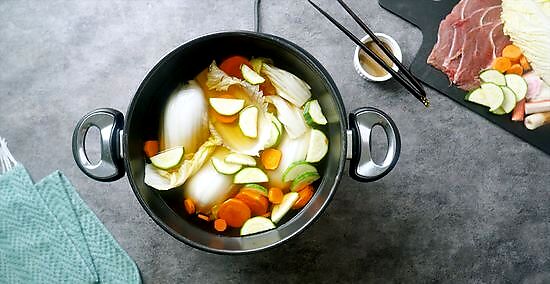
Add your vegetables to the broth and let them cook first. The vegetables will take longer to cook than the meat, so you want to get them started right away. They’ll also add a nice flavor to the broth as they cook. Unlike with the meat, you can drop the vegetables directly into the broth and leave them in there while they cook. You'll know they're cooked through when they're nice and tender. Hard vegetables like carrots, bok choy, broccoli, mushrooms, and peas will take around 3-5 minutes to cook, while leafy vegetables will cook faster. If you’re not sure how long to cook something, ask your server what they recommend. Feel free to start cooking your meat while you wait for the vegetables to cook through.
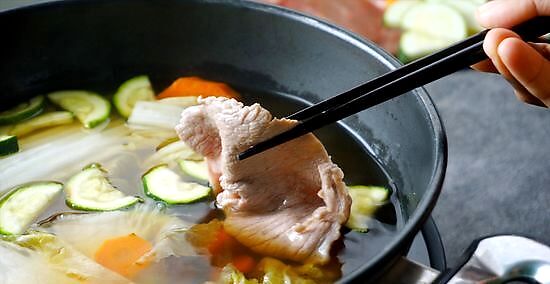
Cook one piece of meat at a time by swishing it in the broth for 10 seconds. Since the slices of meat you’re served are so thin, 10 seconds is all it takes to fully cook them. Don’t drop your meat in the broth or you’ll risk overcooking it. If you accidentally drop it, use the tongs or ladle at your table to quickly scoop it out of the broth. After swishing the piece of meat through the broth for 10 seconds, lift it out of the pot and let the excess broth drip off. You may be a little worried about your meat cooking all the way through if it’s your first time eating shabu shabu. That’s normal, but still try to avoid leaving it in the broth for too long or dumping all of it in the broth at the beginning of your meal. If you overcook the meat, it will develop an unpleasant taste and texture.
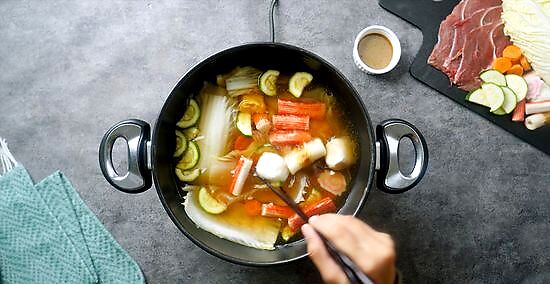
Let dumplings cook in the broth for at least 5 minutes if you’re served any. Dumplings aren’t always served with shabu shabu, but if you’re offered some, you’ll want to cook them for longer than your meat and vegetables since dumplings have a raw filling on the inside. Just drop them in the pot of broth, let them cook for at least 5 minutes, and you’re done! Depending on your preference, you may want to cook your dumplings for longer than 5 minutes (you may be able to cook them for as long as 9 minutes). If you’re not sure, or if you’re worried about your dumplings not being cooked enough, see what your server suggests.
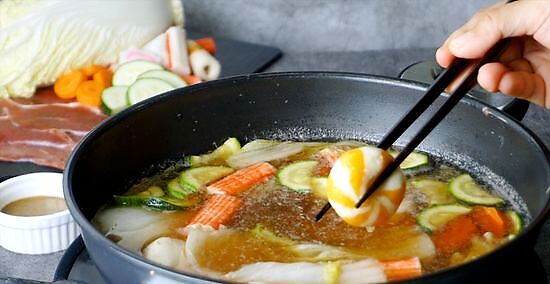
Use chopsticks or tongs to remove the vegetables and any dropped meat. Once your vegetables are finished cooking, grab them with the chopsticks or tongs, then lift them out of the broth and let the excess broth drip off so you don’t make a mess on the table. If you accidentally drop a piece of meat in the broth, quickly grab it with the chopsticks or tongs so it doesn’t overcook.
Enjoying Your Meal
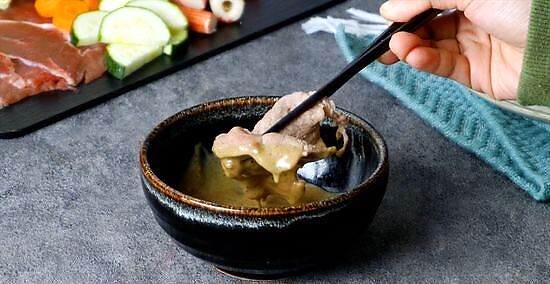
Dip your meat and vegetables in the provided sauces after you cook them. You could skip this step, but the sauces provided by your server are there to help enhance the flavor of your meal. At most shabu shabu restaurants, you’ll be served 2 dipping sauces: ponzu and sesame sauce. Traditionally, people dip their vegetables in the ponzu and their meat in the sesame sauce, but it’s completely up to you. Do whatever you think tastes best. If you’re not sure which sauce is which, your server can help. Usually, sesame sauce is lighter and creamier while ponzu is darker and not as thick.
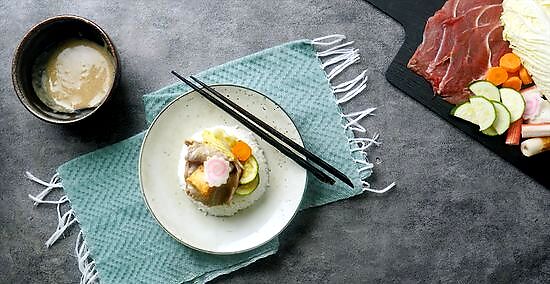
Place your meat and vegetables on top of your rice before you dig in. In addition to your meat, vegetables, and dipping sauces, your server should give you a plate of rice. Don’t mistake this as a side dish—it’s meant to be eaten with everything else! The rice will absorb all the flavors dripping off the meat and vegetables and help tie everything together. Don’t feel like you need to top your entire plate of rice with meat and vegetables before you can start eating. Once you’ve got a few cooked pieces of food on your plate, enjoy! If you don’t like rice, feel free to eat your meat and vegetables by themselves.
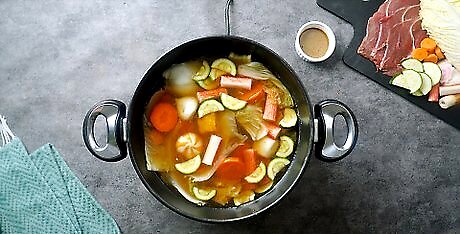
Continue cooking more meat and vegetables throughout your meal. That way, you won't be waiting for more food to cook after you finish your first plate. As you're chowing down on your food, add some more vegetables to the broth so they're cooking while you eat. Then, when you finish, you can quickly cook a few pieces of meat and add the freshly cooked vegetables to your plate. If you run out of meat or vegetables and you're still hungry, ask your server for some more. Depending on where you're eating, you may need to pay for a second helping, so double check first.
















Comments
0 comment